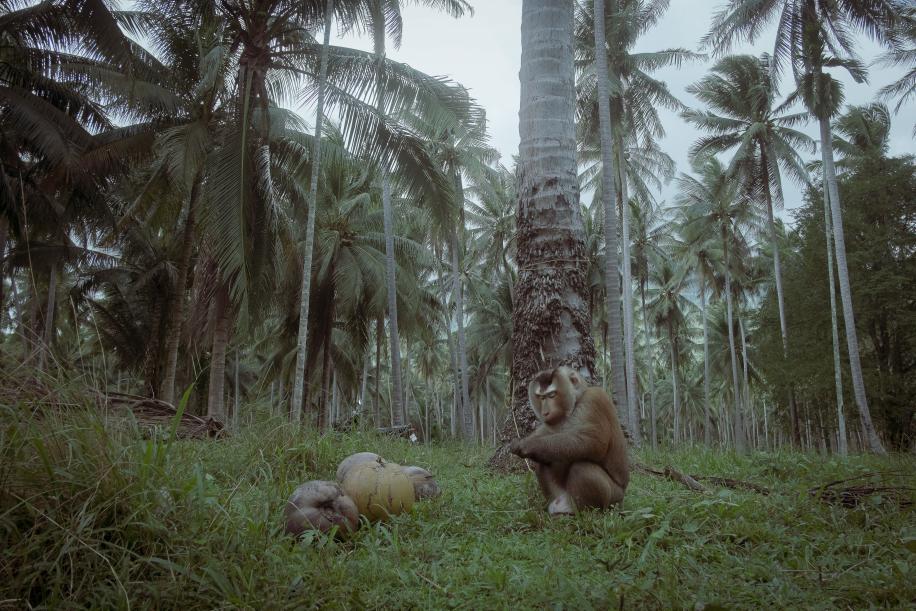

An adult macaque on a coconut plantation refuses to follow orders and pick the coconuts. According to the farmer, this 15-year-old macaque has been employed as a slave in the coconut harvest for 12 years. He has become skilled and productive, but a few weeks ago he started to refuse to work. If he continues to refuse for a few more days, the farmer will abandon him in the jungle where he will not be able to get enough food to survive. At the same time he will become a potential danger to humans because the trauma he has suffered and living in chains all the time makes macaques very aggressive.
Thung Sai, Nakhon Si Thammarat province.
Chained by coconut
Photographer: Raffaele Petralla
Exhibit Title: Chained by coconut
Location: Thailand
Thailand is the world’s first-largest exporter of coconut milk.The basis of this massive business is the exploitation of macaques for the picking of coconuts.Coconut trees in Thailand can reach the height of 30 metres, which makes supply difficult and dangerous. Male primates can harvest up to 1000 coconuts per day, while humans can barely reach the number of 80.Although they should be protected by law as an endangered species, pig-tailed macaques are violently kidnapped from their natural habitat.Across the country there are several so-called “monkey schools” where these animals are intensively trained to work and then sold to farmers.These macaques are condemned to a life of misery and loneliness, chained to trees or old tires without being able to express their ethological needs, socialise and even touch each other. They usually suffer from behavioural disorders and stereotypies as a result of the experienced trauma.
Raffaele Petralla is a documentary photographer, photography professor and videomaker.
He graduated from the Scuola Romana di Fotografia in 2007, in Rome.
After working for several years also on movie sets as lighting assistant, focus puller and camera operator, he decides to devote himself entirely to reportage photography and documentary video, with particular attention to social, anthropological and environmental issues.
Focusing in his research mainly on long term projects, Raffaele has worked in China, Russia, South East Asia and Africa.
His works have been published in over 60 international media including: New York Times, National Geographic, GEO, The Times, The Washington Post, F Days Japan, The New Yorker, Internazionale, De Morgen, L’Espresso and De Volkskrant.
In recent years Petralla has received international awards and nominees.
Since 2015 he has been a member of the Prospekt Photographers agency.
He is teacher in reportage photography at the Spazio Tempo School in Bari.
In 2021 he published the photobook “Mari El, a pagan beauty” produced by Voglino editrice.
www.raffaelepetralla.com
https://www.instagram.com/raffaelepetralla/
https://www.facebook.com/raffaele.petralla
Make Comment/View Comments